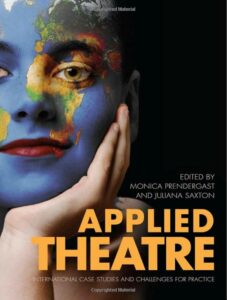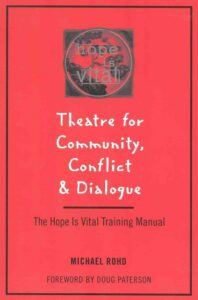Why consider Applied Theatre at IU Indianapolis?
Are you curious as to what defines the term “applied theatre” and whether it is the right artistic and educational career path for you? Well, here’s a great place to start! Applied Theatre is a relatively new term that has emerged in popularity since the end of the 20th century to describe a spectrum of diverse theatrical practices in community, educational, or therapeutic contexts.
Fortunately for you, Indiana University Indianapolis is one of fewer than 10 undergraduate institutions in the United States, where you can earn this degree. This will automatically distinguish you from other budding artists and practitioners, across the nation (and the world!).
What does Applied Theatre look like?
Applied Theatre can take on many forms — scripted, unscripted, improvisational, scripted play development, devised performances, indigenous forms of cultural performance, along with innovative hybrids that incorporate new forms of digital communication. It also includes many other genre-defying forms (that are as unique as your own theatre artistry and aesthetics) and can be informed by the contexts, and spaces where applied theatre work takes place. It is also informed by the communities that are being engaged as learners, collaborators, and “theatre-makers” in the process under the guidance of a teaching artist or facilitator.
What are some of Applied Theatre’s Common Characteristics?
Watch the videos below to learn more about Applied Theatre, the goals of the degree program, and the benefits of pursuing this degree at IU Indianapolis:
Applied Theatre Course Concentration Requirements:
The Applied Theatre concentration requires a minimum of 34 credit hours. The following outlines the specific requirements needed for successful completion of the major. Each of these courses must be passed with a final semester grade of C or ABOVE:

This phenomenal text by Prendergast and Saxton, serves as one of the anchors for coursework in the discipline.
*2 Core Courses in Theatre Production (6 cr.)
*2 Core Courses in Theatre Performance (6 cr.)
*2 Core Courses in Theatre Criticism-History-Theory and/or Interdisciplinary Practice (6 cr.)

Michael Rohd’s text is just one of the revolutionary book’s students will read that help them envision ways theatre processes can be applied to address societal concerns and issues.
*Additional Electives with Independent Studies, Approved Internships and/or Other Course Substitutions:
Independent Studies: Up to 9 credit hours may be earned in the Applied Theatre Concentration by enrolling in COMM G300. These are Independent Studies or (on occasion) internships facilitated by someone in the department who can provide academic oversight in an area of specialization that the student would like to explore. Proposals for G300 Independent Study topics must be approved by the concentration head or coordinator and a rationale must be shared for how this complements the degree plan.
Substitutions/Transferring Credit: With approval of the concentration head or coordinator, certain courses may be substituted for core courses under extenuating circumstances to fulfill degree requirements.
Emilio G. Robles
Assistant Professor in Applied Theatre and Teaching Artist
CA 307B
317-274-2060
egrobles@iu.edu
*Watch the video below to learn more about Applied Theatre degree, and its connection to Liberal Arts and the discipline of Communication Studies:
To help you guide your four-year college journey, consult your degree map for a snapshot of classes you will take to finish your degree.